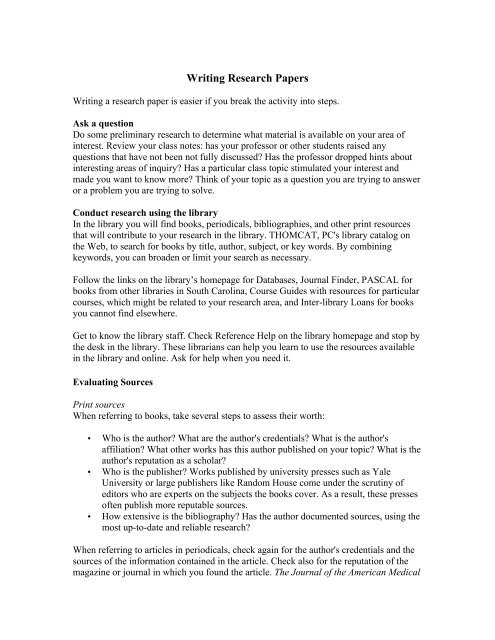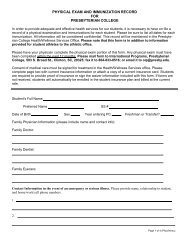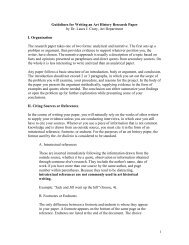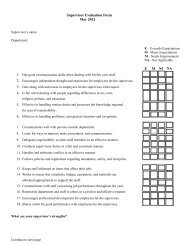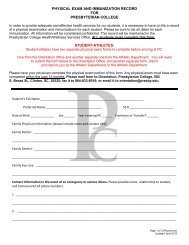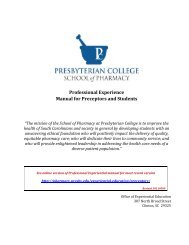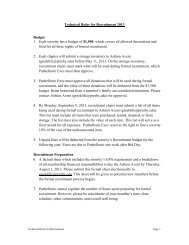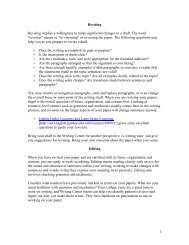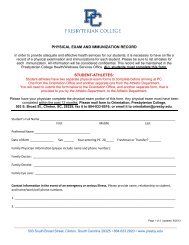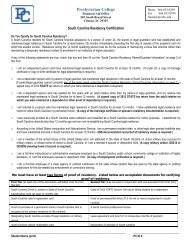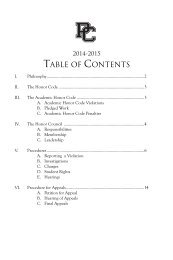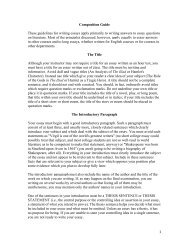Writing Research Papers handout
Writing Research Papers handout
Writing Research Papers handout
Create successful ePaper yourself
Turn your PDF publications into a flip-book with our unique Google optimized e-Paper software.
<strong>Writing</strong> <strong>Research</strong> <strong>Papers</strong><br />
<strong>Writing</strong> a research paper is easier if you break the activity into steps.<br />
Ask a question<br />
Do some preliminary research to determine what material is available on your area of<br />
interest. Review your class notes: has your professor or other students raised any<br />
questions that have not been not fully discussed? Has the professor dropped hints about<br />
interesting areas of inquiry? Has a particular class topic stimulated your interest and<br />
made you want to know more? Think of your topic as a question you are trying to answer<br />
or a problem you are trying to solve.<br />
Conduct research using the library<br />
In the library you will find books, periodicals, bibliographies, and other print resources<br />
that will contribute to your research in the library. THOMCAT, PC's library catalog on<br />
the Web, to search for books by title, author, subject, or key words. By combining<br />
keywords, you can broaden or limit your search as necessary.<br />
Follow the links on the library’s homepage for Databases, Journal Finder, PASCAL for<br />
books from other libraries in South Carolina, Course Guides with resources for particular<br />
courses, which might be related to your research area, and Inter-library Loans for books<br />
you cannot find elsewhere.<br />
Get to know the library staff. Check Reference Help on the library homepage and stop by<br />
the desk in the library. These librarians can help you learn to use the resources available<br />
in the library and online. Ask for help when you need it.<br />
Evaluating Sources<br />
Print sources<br />
When referring to books, take several steps to assess their worth:<br />
• Who is the author? What are the author's credentials? What is the author's<br />
affiliation? What other works has this author published on your topic? What is the<br />
author's reputation as a scholar?<br />
• Who is the publisher? Works published by university presses such as Yale<br />
University or large publishers like Random House come under the scrutiny of<br />
editors who are experts on the subjects the books cover. As a result, these presses<br />
often publish more reputable sources.<br />
• How extensive is the bibliography? Has the author documented sources, using the<br />
most up-to-date and reliable research?<br />
When referring to articles in periodicals, check again for the author's credentials and the<br />
sources of the information contained in the article. Check also for the reputation of the<br />
magazine or journal in which you found the article. The Journal of the American Medical
Association may give you more reliable information on topics related to health than a<br />
local newspaper will.<br />
Internet sources<br />
• First, is an author given? If no author is listed, be skeptical. Most authors are<br />
proud of work they have written if it is reliable. Failure to include as name with<br />
an Internet article may indicate that the article contains unsubstantiated opinions.<br />
• What are the author's credentials? Is the author an expert in the field? Does the<br />
author have obvious biases?<br />
• Is there a print copy of the source? Has it also been published in a magazine or<br />
journal?<br />
What is the source of the information?<br />
• Is the site associated with a professional organization or university? If so, is the<br />
organization devoted to objective study or is it heavily biased?<br />
• Assessing Credibility of Online Sources from St. Cloud State gives some<br />
guidelines: http://leo.stcloudstate.edu/research/credibility1.html<br />
<strong>Research</strong> on the Internet<br />
Evaluating Internet sources is a bigger concern than with books and journals: whereas<br />
book authors and publishers and journal editorial boards control the content of their<br />
resources, the Internet is unmonitored. Although much of what you find may be valuable,<br />
much may be information that lacks documentation or substantiation. Evaluating the<br />
worth of the sources you uncover is perhaps the most important part of research. A paper<br />
is strong only if the information it contains is valid.<br />
Helpful links on searching the Internet<br />
• Conducting <strong>Research</strong> includes a list of search engines and search strategies<br />
http://owl.english.purdue.edu/owl/section/2/8/<br />
• <strong>Research</strong> and Documentation Online provides helpful suggestions for doing<br />
research in various disciplines.<br />
http://bcs.bedfordstmartins.com/resdoc5e/<br />
Keeping track of source material<br />
If you cut and paste from the Internet into a file or document, use a different font for<br />
source material in your early drafts. Put quotation marks around exact words you copy<br />
into your own document. Or paraphrase as you go by looking away from the printed page<br />
as you type your draft or notes. Give the URL (Internet address) or the full citation for<br />
every source you use.
James D. Lester in <strong>Writing</strong> <strong>Research</strong> <strong>Papers</strong>: A Complete Guide (New York: Longman,<br />
1999) gives suggestions for creating effective notes for those of you who write longhand<br />
before going to the computer.<br />
• Use ink and write on index cards with one size for notes and one for bibliography<br />
entries. Write on one side of the card only.<br />
• To paraphrase: rewrite the original in the same number of words by reading the<br />
passage and then looking away from the original as you rewrite it in your own<br />
words. Provide an in-text citation. Use quotation marks to keep exceptional words<br />
and phrases from the original source.<br />
1. Write one item per note (or label single files for notes on computer and label<br />
them for easy retrieval).<br />
2. List the source on each note with the name, year, and page number.<br />
3. Label each note by describing each one or putting one of your own headings on<br />
it.<br />
4. Write a full note in sentence form so that you are already doing the writing for<br />
your paper.<br />
5. Keep everything.<br />
6. Label your personal notes: put PER (personal notes), my ideas, or mine.<br />
7. Conform to conventions of research style if you already know which style you<br />
will use. Write your citations as you go.


